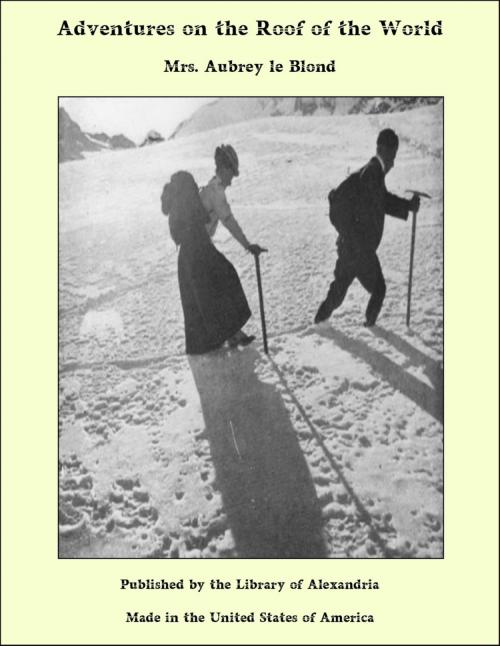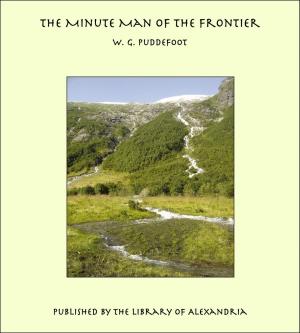Adventures on the Roof of the World
Nonfiction, Religion & Spirituality, New Age, History, Fiction & Literature| Author: | Mrs. Aubrey le Blond | ISBN: | 9781465612915 |
| Publisher: | Library of Alexandria | Publication: | March 8, 2015 |
| Imprint: | Language: | English |
| Author: | Mrs. Aubrey le Blond |
| ISBN: | 9781465612915 |
| Publisher: | Library of Alexandria |
| Publication: | March 8, 2015 |
| Imprint: | |
| Language: | English |
The party were making the ascent of Mount Sefton, and were much troubled by the looseness of the rock on the almost vertical face which they had to climb. However, at last they reached a ridge, “along which,” writes Mr Fitzgerald, “we proceeded between two precipices, descending to the Copland and to the Mueller valleys—some 6000 feet sheer drop on either hand. “We had next to climb about 300 feet of almost perpendicular cliff. The rocks were peculiarly insecure, and we were obliged to move by turns, wherever possible throwing down such rocks as seemed most dangerous. At times even this resource was denied us, so dangerous was the violent concussion with which these falling masses would shake the ridge to which we clung. I carried both the ice axes, so as to leave Zurbriggen both hands free to test each rock as he slowly worked his way upwards, while I did my utmost to avoid being in a position vertically beneath him. “Suddenly, as I was coming up a steep bit, while Zurbriggen waited for me a few steps above, a large boulder, which I touched with my right hand, gave way with a crash and fell, striking my chest. I had been just on the point of passing up the two ice axes to Zurbriggen, that he might place them in a cleft of rock a little higher up, and thus leave me both hands free for my climb. He was in the act of stooping and stretching out his arms to take them from my uplifted left hand, and the slack rope between us lay coiled at his feet. The falling boulder hurled me down head foremost, and I fell about 8 feet, turning a complete somersault in the air. Suddenly I felt the rope jerk, and I struck against the side of the mountain with great force. I feared I should be stunned and drop the two ice axes, and I knew that on these our lives depended. Without them we should never have succeeded in getting down the glacier, through all the intricate ice-fall. “After the rope had jerked me up I felt it again slip and give way, and I came down slowly for a couple of yards. I took this to mean that Zurbriggen was being wrenched from his foot-hold, and I was just contemplating how I should feel dashing down the 6000 feet below, and wondering vaguely how many times I should strike the rocks on the way. I saw the block that I had dislodged going down in huge bounds; it struck the side three or four times, and then, taking an enormous plunge of about 2000 feet, embedded itself in the glacier now called the Tuckett Glacier.
The party were making the ascent of Mount Sefton, and were much troubled by the looseness of the rock on the almost vertical face which they had to climb. However, at last they reached a ridge, “along which,” writes Mr Fitzgerald, “we proceeded between two precipices, descending to the Copland and to the Mueller valleys—some 6000 feet sheer drop on either hand. “We had next to climb about 300 feet of almost perpendicular cliff. The rocks were peculiarly insecure, and we were obliged to move by turns, wherever possible throwing down such rocks as seemed most dangerous. At times even this resource was denied us, so dangerous was the violent concussion with which these falling masses would shake the ridge to which we clung. I carried both the ice axes, so as to leave Zurbriggen both hands free to test each rock as he slowly worked his way upwards, while I did my utmost to avoid being in a position vertically beneath him. “Suddenly, as I was coming up a steep bit, while Zurbriggen waited for me a few steps above, a large boulder, which I touched with my right hand, gave way with a crash and fell, striking my chest. I had been just on the point of passing up the two ice axes to Zurbriggen, that he might place them in a cleft of rock a little higher up, and thus leave me both hands free for my climb. He was in the act of stooping and stretching out his arms to take them from my uplifted left hand, and the slack rope between us lay coiled at his feet. The falling boulder hurled me down head foremost, and I fell about 8 feet, turning a complete somersault in the air. Suddenly I felt the rope jerk, and I struck against the side of the mountain with great force. I feared I should be stunned and drop the two ice axes, and I knew that on these our lives depended. Without them we should never have succeeded in getting down the glacier, through all the intricate ice-fall. “After the rope had jerked me up I felt it again slip and give way, and I came down slowly for a couple of yards. I took this to mean that Zurbriggen was being wrenched from his foot-hold, and I was just contemplating how I should feel dashing down the 6000 feet below, and wondering vaguely how many times I should strike the rocks on the way. I saw the block that I had dislodged going down in huge bounds; it struck the side three or four times, and then, taking an enormous plunge of about 2000 feet, embedded itself in the glacier now called the Tuckett Glacier.















